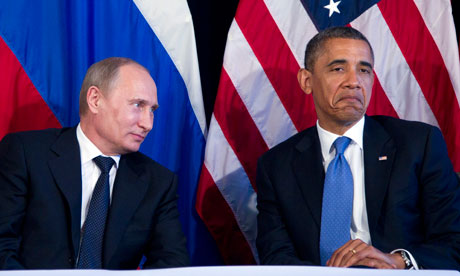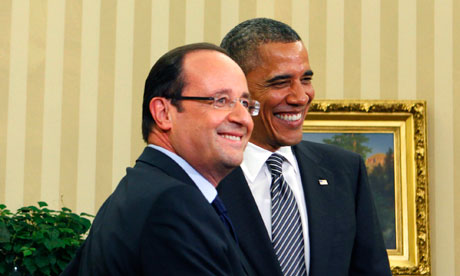It's almost like a tale of two presidential
campaigns, and two Mitt Romneys. In one campaign, most things are going well for
Romney and badly for Barack Obama. Hardly noticed amid the drama of the Supreme Court's decision to uphold the
Affordable Care Act on Thursday was the news that the economy grew at a tepid 1.9 percent in the first quarter. Job growth is consequently slow as well. In fact, at 8.2 percent
unemployment (still several points above what the rate was when Obama took
office), it probably would mark a historic victory for any incumbent to win
reelection in an economy beset by such grim numbers. And there is little doubt that Romney
gets economics, even if you dispute his solutions. At Bain
Capital--whatever else you might think of that firm--Romney was a data and
numbers whiz who took a tiny start-up and turned it into a $4 billion giant. So
in this campaign Romney is looking pretty good, and he has open running room to
go straight at the president's central weakness.
This is Compelling
Romney.
But now there is another dimension to the presidential campaign,
a reinvigorated one that is going to be mainly about repealing the ACA since the
Supreme Court declined to overturn it. The initial reaction of many pundits is
to say this gives Romney a fresh issue to rally his base. But these are no
longer the primaries. His biggest problem is no longer his base; it is capturing the center. And in the general election it is on this issue that Romney
looks weakest, indeed pretty silly. That is because, in effect, the Supreme
Court has just handed Romney the greatest compliment, and the most dramatic
vindication, of his political career: your successful health care law in
Massachusetts is not only effective, it is constitutional. Beyond that, most
polls show that while the ACA is not popular, many voters don't really
understand it and remain undecided about it, and the Obama camp will now embark
on a major selling job on which its numbers have nowhere to go but up. And yet Romney is
being forced to run away from his own greatest achievement as if it were a terrifying ghost
from his past, which, in the context of the Right's new Dogma, it is.
This is Absurd
Romney.
As an example of the Orwellian doublethink in
which presidential candidate Romney must now engage, he will be forced to
repudiate, day after day on the trail, the uber-competent policy-maker he so proudly proclaimed
himself to be only six years ago. And he must pretend, day after day, that
he is really going to repeal "Obamacare" starting on day one of his presidency,
or somehow issue "waivers" to all 50 states, when that will be close to
practically impossible. How many voters will believe this pledge, except for the
rabid Republican base? Probably not many. How many voters will buy the sincerity of his
opposition to the law? Probably not even the Republican base.
Which brings us to Romney's central problem. He
needs to persuade the rational middle of the country--where many voters are
attracted to Compelling Romney but somewhat repelled by Absurd Romney -in order
to win the presidency. Yet now the
Supreme Court has ensured that Obamacare won't go away as an issue for the rest
of the general election, and he has committed himself uncompromisingly to
battling it. Again on Thursday, looking very presidential with the Capitol dome
behind him, Romney pledged to "act to repeal Obamacare" as "bad policy." But measured against his record as governor his words sounded like something out
of 1984, as they did during the primaries. Obama, in his remarks at the
White House on Thursday, indicated he would be refreshing voters' memories about
the two Romneys regularly when he said that a requirement to purchase health
care was supported "even by the current Republican nominee for
president."
The difficulty of Absurd Romney's task is
pointed up by Jonathan Gruber, an MIT
economist who helped Romney design his 2006 health insurance program in
Massachusetts. He says that the then-governor used reasoning and language very
similar to that of Chief Justice John Roberts in arguing for the necessity of an
individual mandate. While Roberts said that Congress did not have the right to
mandate behavior, it did retain the right to "tax and spend," including
penalizing people for not buying health
care.
"It's a penalty for free riding on the system. That's the way Gov.
Romney talked about it," says Gruber, who
later became one of the key architects of President Obama's Affordable Care Act,
which was modeled in part on the Romney law. "Justice Roberts used similar
language today." Back in
the 2000s, when Gruber demonstrated to Romney with computer models that, absent
an individual mandate, one-third of Massachusetts' poorest and sickest would
remain uninsured (and drive up costs for everyone), Romney jumped on the point,
instantly converted, says Gruber. Romney went at the problem "like a management
consultant or an engineer" with no ideological taint, even against the advice of
his conservative political advisers, Gruber says. "They were concerned about the
politics of universal health care. He argued them
down."
Today,
says Gruber, Romney is being "completely disingenuous" in arguing against a law
whose principles he once embraced. And
somewhat absurd. Gruber says Romney's
suggestion that, as in Massachusetts when he was governor, states should be
permitted to decide on their health care plans is also disingenuous.
Massachusetts could devise its health care law only because it had access to a
large amount of federal money, a $385 million Medicaid grant that it needed to
use to extend care to the poor. "He says the states could do it but not the
federal government. Well, actually the states can't do it [because most
don't have that grant]," says Gruber. "What he should be saying is that he 'll
give the states a trillion dollars to come up with their own plans, but he's not
going to do that."
On the whole, Compelling Romney has a much better shot at taking the
White House. But he now must contend with Absurd Romney through the rest of the election campaign .








